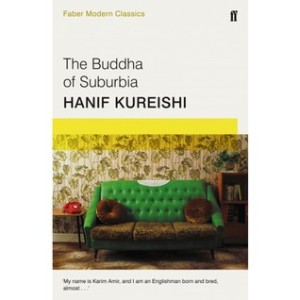 I was disappointed in this book. The Buddha of Suburbia is listed in 1001 Books You Much Read Before You Die, but I confess to complete bewilderment as to why it should be so. I found it trashy and boring.
I was disappointed in this book. The Buddha of Suburbia is listed in 1001 Books You Much Read Before You Die, but I confess to complete bewilderment as to why it should be so. I found it trashy and boring.
The introduction by Zadie Smith did little to enlighten me either. She tells us that as an adolescent she was thrilled to find filthy language in a book rather than on walls, and that she was excited to find her familiar Anglo-Indian world depicted in a novel. She found it funny too, but the humour passed me by.
It’s partly because the book is very dated. Set in the 1970s with incessant references to pop culture as if it matters, it tells the story of an inane young man called Karim who finds everything (school, his family, life &c) irrelevant and boring. His coming-of-age includes the discovery of sex with both boys and girls, and as the novel progresses the author’s attempts at titillation become more and more unsavoury.
His cultural identity issues are the old standards, and there are the usual accusations about British racism, and the whole book is too jolly long because so much of it is repetitive.
I like the Faber Modern Classics series, but I can’t recommend this one.
Author: Hanif Kureishi
Title: The Buddha of Suburbia
Publisher: Faber and Faber, 2015, first published 1990
ISBN: 9780571313174
Review copy courtesy of Allen and Unwin.


I enjoyed this one when I read it although I don’t remember much about it now.
Sorry you were disappointed.
PS: There’s Promise at Dawn in 1001 Books…
LikeLike
By: Emma on June 7, 2015
at 4:33 am
Ah, there are lots of great books in 1001, but there are bound to be disappointments occasionally. I’m reading one by Henry Green now, so I’m feeling much more cheerful:)
LikeLike
By: Lisa Hill on June 7, 2015
at 2:00 pm
I suspect it’s probably on so many lists because it broke a lot of taboos and was the first “popular” book by a British Pakistani. And wasn’t it his first novel? I’ve not read it myself but I did request this Faber classics edition from the publisher … I wonder if I will dislike it as much as you? ;-)
LikeLike
By: kimbofo on June 8, 2015
at 2:21 am
Sorry to be replying to this so late, Kim, some days we get back to the hotel very late after the day’s activities, and I must have missed this comment.
Yes, Zadie Smith in her introduction talk a lot about the taboo-breaking, but that is partly what IMO makes it seem dated now.
But I am also tired of the Brits-are-racist mantra. Britain opened its doors to all and sundry after WW2 when it could barely feed and house its own people, yet those emigrants seem to think that somehow ordinary British people should have known by instinct how to behave towards people so very different from themselves. They muddled through, did the best they could and yes, made plenty of mistakes, but I can’t think of any other country that kept its doors open to a whole new population without massive social conflict. And if it’s such a racist place, why is Britain still the most popular destination for emigrants and refugees for all kinds? IMO it treats its multicultural community much better than some other countries I could name. Not perfect, but not deserving of a constant stream of criticism either, IMO.
LikeLike
By: Lisa Hill on June 13, 2015
at 12:10 am
I read this book a long time ago and really enjoyed it. It is possible that my tastes have changed since then or maybe I read it at exactly the right age? (probably in my mid-twenties) I don’t remember being particularly shocked by the contents – I just found his whole life vividly portrayed and really connected with him. It would be interesting to see if I still liked it now!
LikeLike
By: farmlanebooks on June 9, 2015
at 4:22 am
Thanks for saving me the trouble Lisa.
LikeLike
By: Debbie Robson on July 3, 2015
at 8:32 am
*wink*
LikeLike
By: Lisa Hill on July 3, 2015
at 3:02 pm